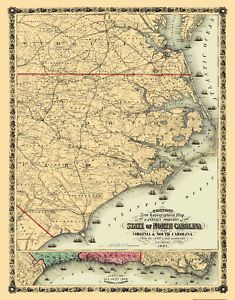 Some war stories are stranger than fiction. Such is the case with the story of 29-year old Robert Franklin Hamilton (1834-1923) from Hendersonville, North Carolina, who today, in Knoxville, Tennessee, enrolls in the 2nd Regiment, North Carolina Mounted Infantry, a Union regiment.
Some war stories are stranger than fiction. Such is the case with the story of 29-year old Robert Franklin Hamilton (1834-1923) from Hendersonville, North Carolina, who today, in Knoxville, Tennessee, enrolls in the 2nd Regiment, North Carolina Mounted Infantry, a Union regiment.
Earlier in the war, in 1862 a newly-married Hamilton joined the army of the Confederate States of America, enrolling in the 62nd Regiment, North Carolina Infantry. The unit served in North Carolina during the next year. Yet not many months had passed after his enrollment that the rebel soldier’s loyalties underwent a metamorphosis. On March 31, 1863 the second son of Robert and Betty Ann Osteen Hamilton was born. The couple named the boy Thomas Lincoln Hamilton, in honor of the president of the United States of America.
Sometime around the birth of Thomas Lincoln, soldier Hamilton, now a Union man at heart, hatched a plan to effect his discharge from the Confederate Army. According to family lore:
He stuck a stick in the roof of his mouth and made a wound to bleed sufficiently to convince his superiors that he was hemorrhaging internally. He was permitted to go home. A little while after being home, he contacted Union Agents and arrangements for him to join the Union Army were made.
Joining the 2nd North Carolina Regiment, Union, Hamilton serves primarily in Tennessee, with stints in Mississippi and western North Carolina, the latter during the final two months of war. He musters out on August 16, 1865.
Following the war, Hamilton returns to Henderson County, North Carolina, where he farms 640 acres and operates a mill. He also becomes a Baptist minister, serving many churches in the region. Again, family lore offers personal insight into Hamilton:
After returning to civilian life following the Civil War, Robert Franklin Hamilton was called of God into the gospel ministry. He committed himself to much study of the bible. He became known far and wide in our mountain area as a very able bible preacher. Among the churches that he served as the pastor are : Crab creek Baptist, Holly Springs Baptist, Beulah Baptist, Pleasant Grove Baptist, Little River Baptist, Pleasant Hill Baptist, Cedar Springs Baptist, and Cross Roads Baptist.
His preaching was heard in many places besides the churches that he pastored. He is also known to have preached at First Baptist Church of Hendersonville, Tuxedo Baptist, Mount Hebron Baptist, Double Springs Baptist and others.
His last sermon was preached one Sunday afternoon at his home. He had the word spread round that he would preach his last sermon on a given date from his front porch. A large crowd gathered to hear his final message as a gospel preacher. Some of his hearers were on the porch and many more filled the yard and road leading to his house.
As he began to preach and because of weakness, he was seated in a chair about two feet from the edge of the porch. However, before he finished his message he had gained inspiration and had received strength enough so that he walked up and down the porch and used his arms and hands for gestures to emphasize what he had to say. After his message he told the crowd, “Everybody stay for supper”.
…. “Luke”, one of the mules Granddaddy Robert used on his farm, was his means of transportation in going to his various preaching points. Unless Granny watched him he might leave wearing the hat he wore while grinding corn at the mill he operated. Granny, described by one of her granddaughters as”fastidious”, was concerned about how her husband looked. She felt he should wear his”gaitor shoes” when he went somewhere to preach. He was a humble man who often referred to himself as “scrappy-hatted bob Hamilton”. He was a man of his word. He did not tell jokes unless it was on himself.
Granddaddy Robert had a policy of not taking an offering for his preaching. If an offering were taken, he asked that it be used for some needy family in the community. He said often, ” I farm for a living, and I preach because I want to”.
Many couples came to granddaddy to get him to marry them including many of his grandchildren. The writer’s grandmother was one of these. His usual fee for marrying a couple was one dollar.
…. Once he walked across the mountain to marry a couple, and following the ceremony, the man gave him a quarter for his services. Granddaddy returned the quarter to the man stating that his regular fee was a dollar. The man handed the quarter back to granddaddy. This is all that he paid. It is not known if this is all the money the man had or if this was all that he felt the service was worth.
Sources: Robert F. Hamilton, Confederate Soldier, 62nd Regiment, North Carolina Infantry, NPS Civil War Soldiers Database (link); Robert F. Hamilton, Union Soldier, 2nd Regiment, North Carolina Infantry, NPS Civil War Soldiers Database (link); “A Short Biography of Robert Hamilton Franklin, 1834-1923” (link); Terry Ruscin, Hidden History of Henderson County, North Carolina, Charleston: History Press, 2013, p. 104 (link)


